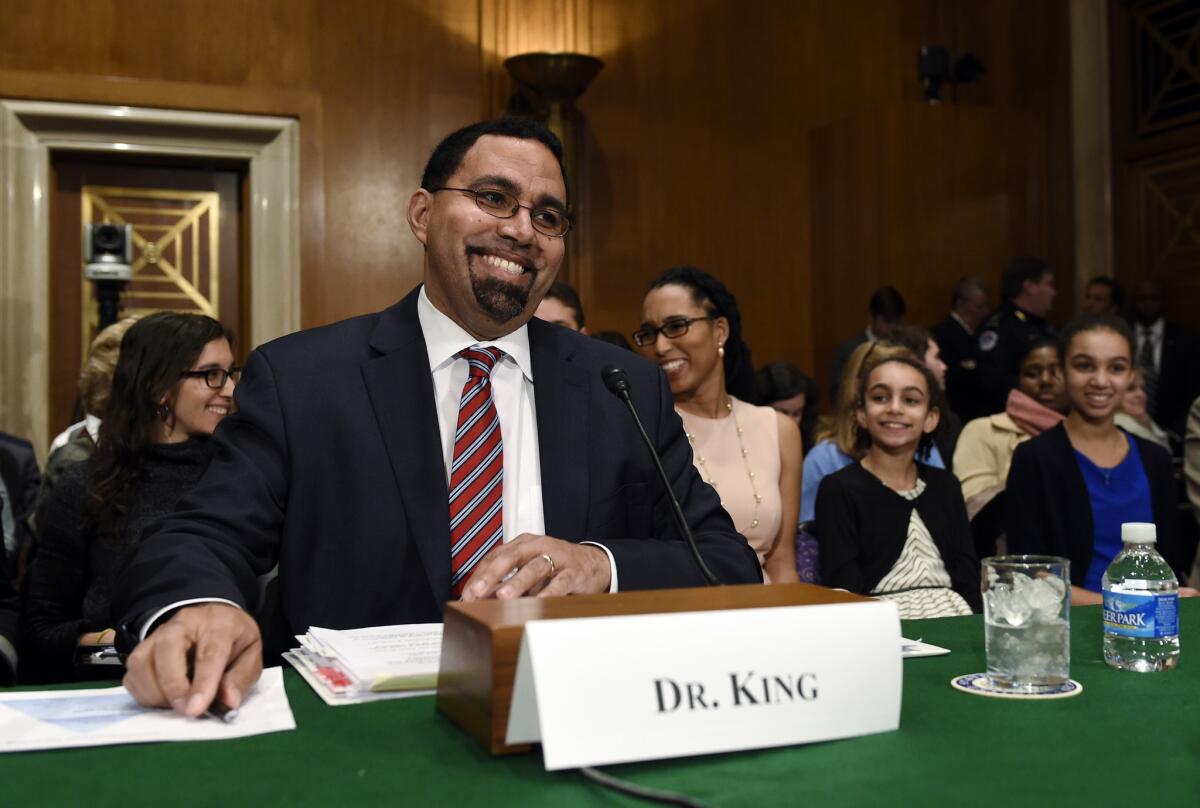The federal government wants colleges to limit questions about applicants’ criminal records

- Share via
U.S. Secretary of Education John B. King Jr. wants colleges to stop asking applicants about their criminal histories early in the admissions process, he announced at UCLA on Monday.
Asking prospective students for information about their criminal history can prevent them from finishing their applications, King said.
Because a disproportionate number of people who have been charged with crimes are people of color, the U.S. Department of Education says, these questions add one more barrier to those that disadvantaged students already face when seeking a college education.
“Rather than asking how do we limit opportunity, we should be asking how do we broaden opportunity,” King said. “How do we ensure that our educational institutions welcome all students who want to improve themselves?”
The Department of Education sent a guide called “Beyond the Box” to presidents of colleges across the country. The guide comes with a letter that urges them to “attract a diverse and qualified student body without creating unnecessary barriers for prospective students who have been involved with the justice system.”
We must ensure that more people ... have the chance at higher education opportunities.
— U.S. Secretary of Education John B. King Jr.
In addition to King, several activists, including actor Tim Robbins, and students spoke about their experiences trying to apply to college after serving their sentences.
Daryl Atkinson called himself “someone who has been impacted by the box.” In 1996, he was incarcerated for a first-time nonviolent drug crime in Alabama, and served the mandatory 40 months on a 10-year sentence. He said he went to jail with a high school diploma and left the same way, because “Alabama is not as progressive as some other states.”
After leaving jail, he completed his associate’s degree with a 4.0 GPA and summa cum laude honors, but was rejected from a state school in South Carolina after disclosing his record.
“The only thing I could attribute that denial letter to was my past criminal history,” he said.
He turned to his family for support and ultimately was accepted into a different school. He eventually earned a law degree and now serves as a fellow at the U.S. Department of Justice.
Los Angeles Mayor Eric Garcetti announced he would create a challenge that would “convene all our institutions of higher learning, admissions leadership, to see if we can have a playbook” on how to make colleges more accessible to people who have been incarcerated.
Garcetti proposed learning from UCLA, and said he might ultimately take the results to the U.S. Conference of Mayors to encourage other cities to follow suit.
“Let’s get the competitive juices flowing and get universities to say, ‘I’m not a great university until I have a program that’s addressing it,’” he said.
King made the announcement at UCLA because he considers the University of California to be a model system in this regard.
The UC system has never asked for information related to applicants’ criminal backgrounds, said Stephen Handel, UC’s associate vice president of undergraduate admissions.
Once students are admitted, he said, specific campuses can ask for criminal histories on housing application forms.
According to a 2015 Center for Community Alternatives study, two-thirds of a sample of 2,924 people with felony convictions who began applications to State University of New York never finished the applications, in part because of questions concerning their convictions.
In an interview, King conceded that “this is an area where very limited research has been done.”
He called for additional research but also pointed to the UC system, where, he said, “we have generations of students who have … graduated without those questions being asked as part of the admissions process.”
Kim Hunter Reed, deputy undersecretary of education, said the government wants universities to ask themselves whether they truly need applicants’ criminal histories, and if they decide they do, to delay asking about that history until an applicant is further in the admission process.
Though the federal government has no means of enforcing the proposal, officials hope to influence universities to be more sensitive toward people who have been in prison.
The proposal follows other attempts to keep people with criminal backgrounds from being permanently stigmatized, including the Second Chance Pell Pilot program, which gives incarcerated Americans a chance to receive federal Pell Grants to pay for college.
Students and parents have long cited campus crime as a major concern in college selection, and the federal government has been outspoken on the need to reduce sexual assault on college campuses, but Reed said that there is no tension between those issues and the government’s efforts to make it easier for applicants with criminal backgrounds to get into college.
The FAFSA, the federal form that students can fill out to apply for financial aid, does ask about criminal backgrounds. Reed said the question is legally required, but officials have tried to limit what it asks for. “Members of Congress are revisiting the question,” she said.
According to the federal report, 66% of colleges collect criminal history information from all prospective students, and 5% seek it from only some students. Schools in the California State University system don’t ask applicants about their criminal backgrounds.
The Common Application, an application form used by about 700 universities, including Stanford and USC, has a question that asks whether students have ever been convicted or adjudicated guilty of a “felony, misdemeanor, or other crime.”
For the next admissions season, the Common Application will get rid of the “other crime” category, said senior director Aba Blankson, because people found it to be ambiguous. The organization is researching other potential changes, including whether asking students about their criminal history can have adverse effects on their applications.
Twitter: @Joy_Resmovits
UPDATES:
7:40 p.m.: This article was updated with additional information.
This article was first published at 3 a.m.
More to Read
Sign up for Essential California
The most important California stories and recommendations in your inbox every morning.
You may occasionally receive promotional content from the Los Angeles Times.











